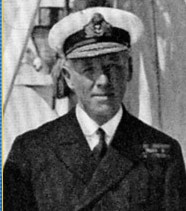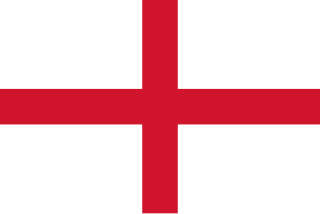 W
WThe Admiral of the White was a senior rank of the Royal Navy of the United Kingdom, immediately outranked by the rank Admiral of the Red. Royal Navy officers currently holding the ranks of commodore, rear admiral, vice admiral and admiral of the fleet are sometimes considered generically to be admirals. From 1688 to 1805 this rank was in order of precedence second; after 1805 it was the third. In 1864 it was abolished as a promotional rank..
 W
WThe Admiral of the Blue was a senior rank of the Royal Navy of the United Kingdom, immediately outranked by the rank Admiral of the White. Royal Navy officers currently holding the ranks of commodore, rear admiral, vice admiral and admiral of the fleet are sometimes considered generically to be admirals. From 1688 to 1805 this rank was in order of precedence third; after 1805 it was the fourth. In 1864 it was abolished as a promotional rank. The command flag for an Admiral of the Blue is a plain blue flag.
 W
WBaron Chatfield, of Ditchling in the County of Sussex, was a title in the Peerage of the United Kingdom. It was created in 1937 for the naval commander Sir Ernle Chatfield. The title became extinct on the death of his son, the second Baron, in 2007 in Victoria, British Columbia, Canada.
 W
WThe Admiral of the South, North and West formally known as Admiral of the Kings Southern, Northern and Western Fleets or Admiral of all the Fleets about England was a senior English Navy appointment and Commander-in-Chief of the English Navy from 1360 to 1369.
 W
WAdmiral of the Fleet is a five-star naval officer rank and the highest rank of the Royal Navy formally established in 1688. The five-star NATO rank code is OF-10, equivalent to a field marshal in the British Army or a marshal of the Royal Air Force. Other than honorary appointments no new admirals of the fleet have been named since 1995.
 W
WThe Admiral of the South, North and West formally known as Admiral of the Kings Southern, Northern and Western Fleets or Admiral of all the Fleets about England was a senior English Navy appointment and Commander-in-Chief of the English Navy from 1360 to 1369.
 W
WThe Admiral of the Narrow Seas also known as the Admiral for the guard of the Narrow Seas was a senior Royal Navy appointment. The post holder was chiefly responsible for the command of the English navy's Narrow Seas Squadron also known as the Eastern Squadron that operated in the two seas which lay between England and Kingdom of France and England and the Spanish Netherlands later the Dutch Republic from 1412 to 1688. His subordinate units, establishments, and staff were sometimes informally known as the Command of the Narrow Seas.
 W
WThe Admiral of the North also known as Admiral of the Northern Seas and Admiral of the Northern Fleet was a senior English Navy appointment. The post holder was chiefly responsible for the command of the navy's fleet that operated in the North Sea and off the English coast out of Yarmouth from 1294 to 1412.
 W
WThe Admiral of the North and West or Admiral of the North and Western Fleets was a former senior appointment of the English Navy. The post holder was Commander-in-Chief of the English navy's North and Western Fleets operating in the North Sea, the English Channel, the Southern Irish Sea and Atlantic from 1364 to 1414.
 W
WThe Admiral of the North and West or Admiral of the North and Western Fleets was a former senior appointment of the English Navy. The post holder was Commander-in-Chief of the English navy's North and Western Fleets operating in the North Sea, the English Channel, the Southern Irish Sea and Atlantic from 1364 to 1414.
 W
WThe Admiral of the North also known as Admiral of the Northern Seas and Admiral of the Northern Fleet was a senior English Navy appointment. The post holder was chiefly responsible for the command of the navy's fleet that operated in the North Sea and off the English coast out of Yarmouth from 1294 to 1412.
 W
WThe Admiral of the North also known as Admiral of the Northern Seas and Admiral of the Northern Fleet was a senior English Navy appointment. The post holder was chiefly responsible for the command of the navy's fleet that operated in the North Sea and off the English coast out of Yarmouth from 1294 to 1412.
 W
WSea Cadets is a national youth charity, working with 15,000 young people between 10 and 18 years old across the UK. It has over 400 units across England, Scotland, Wales, Northern Ireland, Malta and Bermuda all run by 9,000 volunteers. Cadets follow a similar ethos, training plan, and ranks, to the Royal Navy, and are recognised by the UK Ministry of Defence.
 W
WThe Admiral of the South also known as Admiral of the Southern Fleet was a senior English Navy appointment. The post holder was chiefly responsible for the command of the navy's fleet that operated in the English Channel out of Portsmouth from 1294 to 1326.
 W
WThe Admiral of Patrols was a former command appointment within the Admiralty during world war one usually held by a junior flag officer the post was established from 1912 to 1916.
 W
WAdmiral is a senior rank of the Royal Navy of the United Kingdom, which equates to the NATO rank code OF-9, outranked only by the rank of admiral of the fleet. Royal Navy officers holding the ranks of rear admiral, vice admiral and admiral of the fleet are sometimes considered generically to be admirals. The rank of admiral is currently the highest rank to which a serving officer in the Royal Navy can be promoted, admiral of the fleet being in abeyance except for honorary promotions of retired officers and members of the Royal Family.
 W
WThe Admiral of the South, North and West formally known as Admiral of the Kings Southern, Northern and Western Fleets or Admiral of all the Fleets about England was a senior English Navy appointment and Commander-in-Chief of the English Navy from 1360 to 1369.
 W
WThe Admiral of the South also known as Admiral of the Southern Fleet was a senior English Navy appointment. The post holder was chiefly responsible for the command of the navy's fleet that operated in the English Channel out of Portsmouth from 1294 to 1326.
 W
WThe Admiral of the West, also known as Admiral of the Western Seas or Admiral of the Western Fleet, was formerly an English Navy appointment. The postholder was chiefly responsible for the command of the English navy's fleet based at Portsmouth, which operated in the English Channel, Irish Sea and Atlantic Ocean, from 1294 to 1412.
 W
WThe Admiral of the West, also known as Admiral of the Western Seas or Admiral of the Western Fleet, was formerly an English Navy appointment. The postholder was chiefly responsible for the command of the English navy's fleet based at Portsmouth, which operated in the English Channel, Irish Sea and Atlantic Ocean, from 1294 to 1412.
 W
WThe Admiral of the White was a senior rank of the Royal Navy of the United Kingdom, immediately outranked by the rank Admiral of the Red. Royal Navy officers currently holding the ranks of commodore, rear admiral, vice admiral and admiral of the fleet are sometimes considered generically to be admirals. From 1688 to 1805 this rank was in order of precedence second; after 1805 it was the third. In 1864 it was abolished as a promotional rank..
 W
WAdmiral William Lloyd was from Carmarthenshire, Wales and became an Admiral of the White for the Royal Navy. He sailed Governor Edward Cornwallis aboard HMS Sphinx to establish Halifax, Nova Scotia (1749).